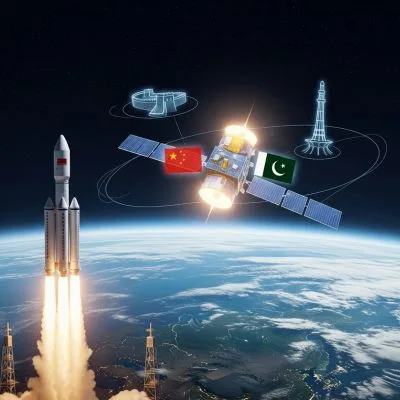Startups & Business News
China Sends Remote-Sensing Satellite into Space for Pakistan: A Leap in Strategic Space Partnership
KEY POINTS
Pakistan successfully launched a new remote-sensing satellite in partnership with China, using a Kuaizhou-1A rocket from Xichang Satellite Launch Center.
The satellite will boost Pakistan’s ability in disaster management, urban planning, environmental monitoring, agriculture, and water resource management.
This launch marks a significant milestone for Pakistan’s space program and strengthens strategic cooperation between China and Pakistan.
Advanced imaging technology will support national development initiatives like the China-Pakistan Economic Corridor, providing high-resolution, round-the-clock Earth observations

A New Era for Pakistan’s Space Ambitions
In a major stride for Pakistan’s technological and space ambitions, the country—with the assistance of its steadfast partner, China—successfully launched a new remote-sensing satellite on July 31, 2025. As the Kuaizhou-1A carrier rocket lifted off from the Xichang Satellite Launch Center in southwest China, it marked not just a technical achievement but a powerful symbol of the growing strategic partnership between these two nations.
What Makes This Satellite Launch Special?
The newly deployed satellite, the result of close collaboration between Pakistan’s SUPARCO (Space and Upper Atmosphere Research Commission) and major Chinese technology entities, is equipped with cutting-edge imaging systems. These advanced sensors are designed to support high-resolution, continuous Earth observation, crucial for:
Urban planning and infrastructure development.
Disaster management for rapid response to natural disasters like floods, earthquakes, and landslides.
Agricultural monitoring to ensure food security and boost crop yields.
Environmental protection through precise tracking of climate change, deforestation, and glacier melt.
Water resource and land management for better regional planning and sustainability.
This is the 29th mission for the Kuaizhou-1A rocket, underlining China’s rising profile as a major launcher of satellites for friendly nations.
The Power of Strategic Cooperation
The launch is the latest in a string of technological collaborations under the China-Pakistan Economic Corridor (CPEC) framework, reinforcing what many call the “iron brotherhood” between the two countries. Chinese and Pakistani officials alike have called attention to how space technology cooperation now transcends ground infrastructure, extending their partnership “beyond the skies.” Pakistani Planning Minister Ahsan Iqbal highlighted this mission as a “moment that lifts our national spirit,” while also acknowledging the unwavering dedication of scientists, engineers, and policy-makers on both sides.
Impact on National Development
This new satellite is not just about scientific prestige. With its integrated Earth observation capabilities, Pakistan gains a crucial asset for mapping transportation networks, assessing geo-hazard risks on key CPEC projects, monitoring infrastructure growth, and responding quickly to environmental threats. These capabilities will be vital for socio-economic development, boosting resilience in times of disaster, and delivering information that can lead to better policy-making in sectors like food security and environmental sustainability.
The satellite’s launch—and its soon-to-begin data transmissions—signal that Pakistan is not merely increasing its space footprint, but is also actively modernizing how it responds to the intertwined challenges of climate, food, and city growth.
Not Just a Technological Triumph
Perhaps most importantly, the launch demonstrates how international partnerships in space exploration are no longer limited to elite clubs or traditional superpowers. Pakistan’s ascent, armed with Chinese technical support, reaffirms its place among the community of spacefaring nations. As President Asif Ali Zardari and Prime Minister Shehbaz Sharif both noted, the nation takes pride in the capabilities of its scientists and engineers—a pride echoed by observers across the region.
The Road Ahead
With the successful deployment of this high-tech Earth observation satellite, Pakistan is poised to maximize technology as a lever for development and resilience. The new satellite stands as a testament to what can be achieved through motivated partnership, skilled engineering, and a clear vision for the future.
In an era marked by accelerated global technological advancement, this moment is a reminder that strategic alliances, scientific dedication, and innovation can yield tangible, ground-breaking results for emerging economies.

futureTEKnow
Editorial Team
futureTEKnow is a leading source for Technology, Startups, and Business News, spotlighting the most innovative companies and breakthrough trends in emerging tech sectors like Artificial Intelligence (AI), Robotics, and the Space Industry.
Discover the companies and startups shaping tomorrow — explore the future of technology today.
Most Popular
Trending Companies
Latest Articles

AI-Driven Logistics & Distribution Transformation: From Insight to Scalable Impact
AI is redefining logistics transformation—from network design to real-time execution. This article explores how data-driven insight, intelligent automation, and scalable

Hai Robotics Hong Kong IPO: From Startup Funding to Warehouse Robot Leader
Shenzhen’s Hai Robotics, pioneer in ACR warehouse robots, files for HK IPO after raising over $500M in funding rounds led

AI-Enabled Process Engineering & Continuous Improvement: Designing Systems That Learn
Explore how AI transforms process engineering and continuous improvement into self-learning systems. This article explains how organizations can design operations

Ouster Acquires StereoLabs: Unified Physical AI Sensing Platform Launches
Ouster’s $35M StereoLabs acquisition fuses lidar and ZED cameras into end-to-end Physical AI sensing. Founders Cecile Schmollgruber and team drive

Bretton AI Lands $75M Series B Funding to Scale AI Agents for Financial Crime and AML/KYC Compliance
Bretton AI’s $75M Series B modernizes AML KYC compliance via AI agents, slashing staffing costs for banks and fintechs like

Axiom Space Raises $350M to Build Commercial Space Station and NASA Spacesuits
Axiom Space has locked in a fresh $350M raise to push its commercial space station and NASA lunar spacesuits toward

Foundation Humanoid Robot: Phantom MK1 Overview, Military Plans, and Factory Deployments
Foundation’s Phantom MK1 humanoid robot hits factories and eyes military use. Check specs, pilots, and bold 50k goal by 2027.

Morpheus Space Raises $15M for GO-2 Electric Propulsion Mass Production
Morpheus Space secures $15M funding for GO-2 electric propulsion mass production. Learn how this boosts satellite mobility with efficient thrusters.

Designing Warehouse Automation Through Operating Strategy
Discover how leading companies design warehouse automation through integrated operating strategies. Learn how AI, robotics, and adaptability drive efficiency and

Bedrock Robotics Raises $270M Series B: Autonomy for Construction Boom
Exciting news: Bedrock Robotics just scored $270M in Series B to power up autonomous machines on job sites. Led by

Applied EV secures $30.7M to scale Blanc Robot autonomous delivery EVs for logistics, mining and last‑mile freight
Discover how Applied EV’s $30.7M NRF investment boosts Blanc Robot EVs for tough jobs in mining and logistics. Founders reveal

Stoke Space Secures $860M in Extended Series D Funding for Reusable Nova Rockets
Stoke Space extended its Series D funding to $860 million, fueling Nova’s full-reuse rocket production at Cape Canaveral. Backed by
futureTEKnow is focused on identifying and promoting creators, disruptors and innovators, and serving as a vital resource for those interested in the latest advancements in technology.
© 2026 All Rights Reserved.
![Discover the top 10 AI companies in Germany [1st Edition], revolutionizing industries with cutting-edge technology and innovations.](https://futureteknow.com/wp-content/uploads/2025/02/Top-10-AI-Companies-in-Germany-Leading-the-Tech-Revolution-futureTEKnow.jpg)







